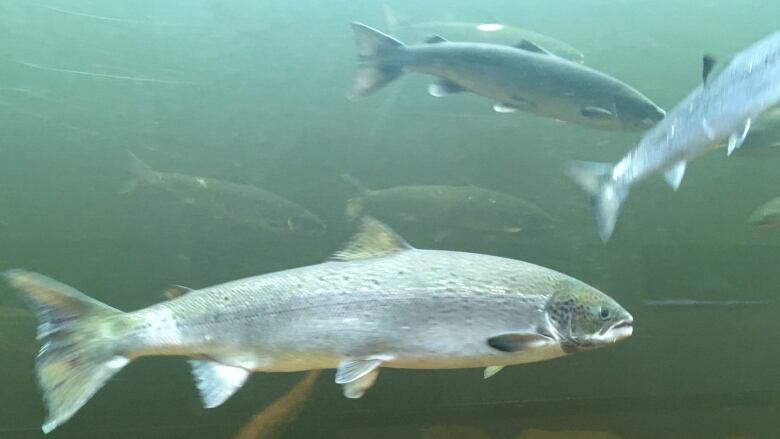N.L. aquaculture industry working to reduce farmed salmon escapes
Norwegian company bringing its 'escape-proof' technology to Placentia Bay farm

"Escape-proof"cages and continued collaboration with the Department of Fisheries and Oceans are two of the ways the province's aquaculture industry plans on mitigating concerns aboutfarmed salmon escaping on Newfoundland's south coast.
"Absolutely, we are concerned.What we are most concerned about isto... reduce the number of escapes," saidMark Lane, the executive director of the Newfoundland Aquaculture Industry Association onCBC Radio's St. John's Morning Show.
Lane's comment comes on the heels ofTuesday's reportfrom DFO scientists, documenting evidence in 17 rivers in the Fortune Bay and Bayd'Espoirareas whereescapedsalmon have interbredwith their wild counterparts.
Lane called the study "an eye opener, for sure," although he noted the association has been collaborating with DFO's research into interbreeding and had "been aware of this for quite some time."
The last thing a farmer wants to happen is to lose animals, it's their product.- Mark Lane
Hesaid the association has pledged to continue working closely with DFO scientists, and is also independently trying to reduce escapees.
"We've invested heavily in technology and innovation and design to prevent that. The last thing a farmer wants to happen is to lose animals, it's their product."
Norwegian technology in Placentia Bay
A source of controversy over Grieg NL Seafarm'splanned aquaculture megaproject in Placentia Bay has been the potential for escapees from its 11 proposed sea cage sites.
-
Grieg NL Seafarms says Placentia Bay project is sustainable, environmentally responsible
-
Major aquaculture project in Placentia Bay released from N.L. environmental assessments
But Aqualine, theNorwegian company hired by Grieg to produce thosesea cages, promises they'll be built according to itspatented design, claimed to beescape-proof.
"By doing model testing and testing also in the sea afterwards, we believe we have created the best escape-proof system," said Aqualine Technical Director Martin Soreide.
Soreidesaid thattechnology has been in use in about 600 other aquaculture sites since 2013, without a single recorded escape.
"It's100 per cent escape-proof, if the customer is using it the right way," he said, adding sea conditions in Placentia Bay do not differ significantly from other client sites, such as Iceland, Norway and Scotland.
Soreide said his team will be on hand in Placentia Bay to make sure the cages are operated correctly once the project is off the ground, although the project is still in the midst of the regulatory process and isfar from becoming a reality.
With files from The St. John's Morning Show and The Broadcast












_(720p).jpg)


 OFFICIAL HD MUSIC VIDEO.jpg)
.jpg)



























































































